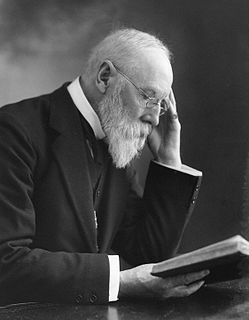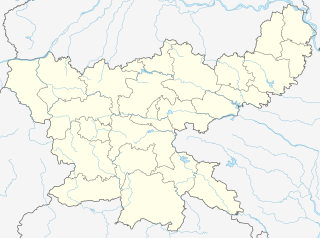
Major James Rennell, FRS FRSE FRGS was an English geographer, historian and a pioneer of oceanography. Rennell produced some of the first accurate maps of Bengal at one inch to five miles as well as accurate outlines of India and served as Surveyor General of Bengal. Rennell has been called the FatherofOceanography. In 1830 he was one of the founders of the Royal Geographical Society in London.

Bihar and Orissa was a province of British India which included the present-day Indian states of Bihar, Jharkhand, and a part of Odisha. The territories were conquered by the British in the 18th and 19th centuries, and were part of the Bengal Presidency, the largest British province in India.

Sir George Abraham Grierson was an Irish administrator and linguist in British India. He worked in the Indian Civil Services but an interest in philology and linguistics led him to pursue studies in the languages and folklore of India during his postings in Bengal and Bihar. He published numerous studies in the journals of learned societies and wrote several books during his administrative career but proposed a formal linguistic survey at the Oriental Congress in 1886 at Vienna. The Congress recommended the idea to the British Government and he was appointed superintendent of the newly created Linguistic Survey of India in 1898. He continued the work until 1928, surveying people across the British Indian territory, documenting spoken languages, recording voices, written forms and was responsible in documenting information on 179 languages, defined by him through a test of mutual unintelligibility, and 544 dialects which he placed in five language families. He published the findings of the Linguistic Survey in a series that consisted of 19 volumes.
Archibald Campbell of the Bengal Medical Service was the first superintendent (1840-1862) of the sanitarium town of Darjeeling in north east India. He also took a great interest in ethnology, economic botany and the study of the region and wrote extensively in the Journal of the Asiatic Society of Bengal under the name of "Dr. Campbell" or "Dr. A. Campbell" which has led some authors to misidentify his first name as Arthur or even Andrew. Campbell is credited with the introduction of tea cultivation in Darjeeling and for playing a role in the early experiments on the cultivation of Cinchona. Campbell corresponded with numerous naturalists including B.H. Hodgson and Sir Joseph Hooker. The latter travelled around Sikkim with Campbell on an expedition in which the two were held prisoner by a local ruler. This incident led to the British annexation of the Sikkim Terai region.
Malto or Paharia or, rarely, archaically, Rajmahali is a Northern Dravidian language spoken primarily in East India.

The Orissa famine of 1866 affected the east coast of India from Madras northwards, an area covering 180,000 miles and containing a population of 47,500,000; the impact of the famine, however, was greatest in Orissa, now Odisha, which at that time was quite isolated from the rest of India. In Odisha, one third of the population died due to famine.

This is a timeline of major famines on the Indian subcontinent during British rule from 1765 to 1947. The famines included here occurred both in the princely states, British India and Indian territories independent of British rule such as the Maratha Empire.

The Bihar famine of 1873–1874 was a famine in British India that followed a drought in the province of Bihar, the neighboring provinces of Bengal, the North-Western Provinces and Oudh. It affected an area of 140,000 square kilometres (54,000 sq mi) and a population of 21.5 million. The relief effort—organized by Sir Richard Temple, the newly appointed Lieutenant-Governor of Bengal—was one of the success stories of the famine relief in British India; there was little or no mortality during the famine.
The Maratha invasions of Bengal, also known as the Maratha expeditions in Bengal, refers to the six invasions by the Maratha forces between 1741 and 1751 in the Bengal Subah, after their successful campaign in the Carnatic region in South India. During their invasions and occupations of Bengal, the Maratha forces employed a scorched earth strategy, and perpetrated widespread massacres against the local population, and devastate Bengal's economy. Close to 400,000 civilians in Bengal and Bihar - from both the Muslim and Hindu communities - are estimated to have been killed by the Marathas. Contemporary accounts of the invasions report and mutilation of victims by the Marathas which included cutting off their hands and noses.

This is a list of books in the English language which deal with Albania and its geography, history, inhabitants, culture, biota, etc.

South Karanpura Coalfield is located in Ramgarh district in the Indian state of Jharkhand.

North Karanpura Coalfield is located in Ranchi, Hazaribagh, Ramgarh and Chatra districts in the Indian state of Jharkhand. The coalfield spreads over to Palamu district.

Ramgarh Coalfield are located in Ramgarh district in the Indian state of Jharkhand.

West Bokaro Coalfield is located in Ramgarh district in the Indian state of Jharkhand.

East Bokaro Coalfield is located in Hazaribagh and Bokaro districts in the Indian state of Jharkhand.
Sir Edward Albert Gait (1863–1950) was an administrator in the Indian Civil Service who rose to serve as Lieutenant-Governor of the Bihar and Orissa Province in the Bengal Presidency of British India. He held that office for the years 1915–1920, with a brief absence during April–July 1918 when Edward Vere Levinge officially acted in the position.

Bihar Province was a province of British India, created in 1936 by the partition of the Bihar and Orissa Province.

Orissa Province was a province of British India created in April 1936 by partition of the Bihar and Orissa Province. It is now the State of Odisha.

Jungle Terry or Jungleterry, from Hindi: जंगल तराई jangal tarāi, meaning 'jungle lowland', was a term applied in the 18th century to an area bordering Bengal and Bihar that included large tracts of Bhagalpur and Monghyr districts, as well as the Santal Parganas district.
The elections in India in 2019 that includes general election, by-elections to the Lok Sabha, elections to the Rajya Sabha, elections to seven state legislative assemblies and numerous other by-elections to the state legislative assemblies, councils and local bodies.








